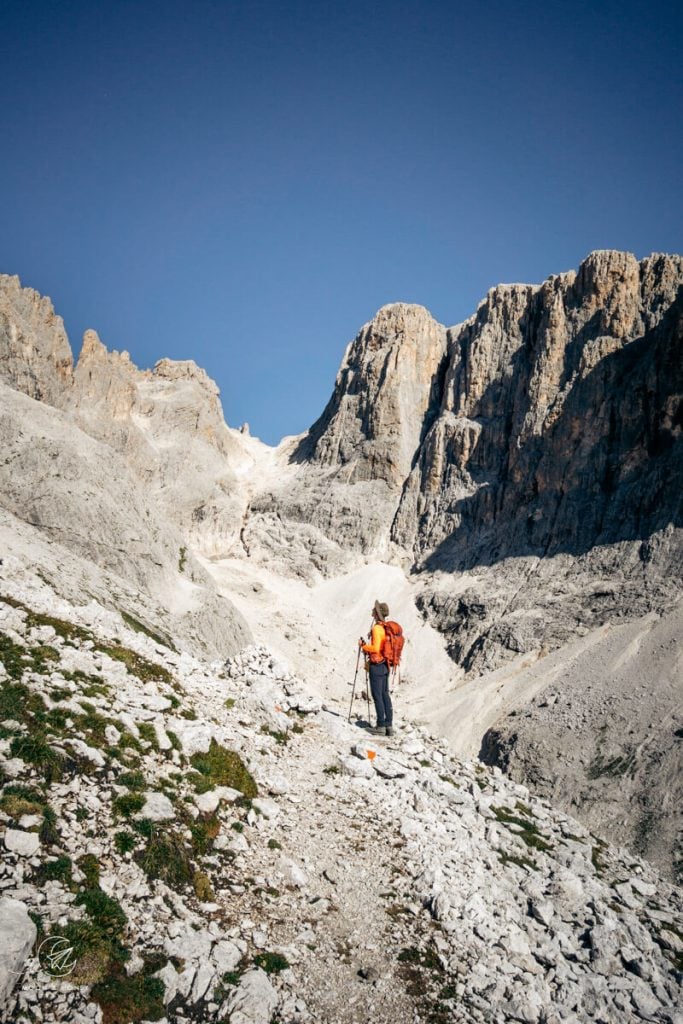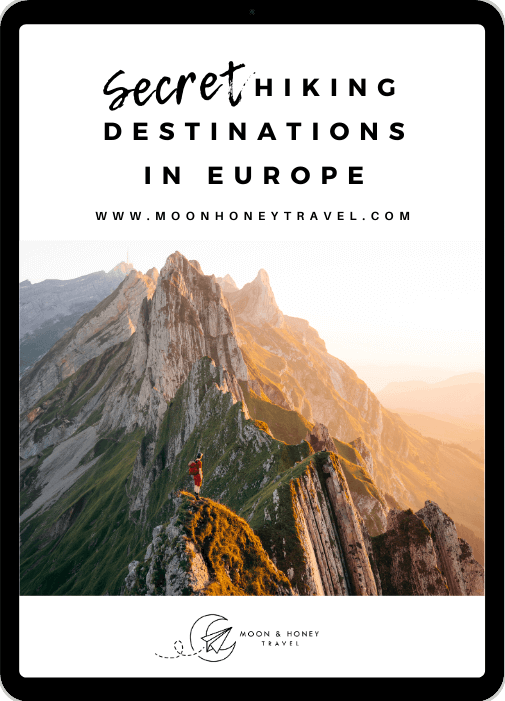Cima della Vezzana (3192 m) is the highest peak in the Pale di San Martino Group in the Italian Dolomites. However, from multiple angles, the slightly lower Cimon della Pala (3184 m) actually appears to be higher.
Experienced alpine hikers keen on summiting this peak can start their hike at the Rosetta Cableway Mountain Station in San Martino di Castrozza, thus trimming off 1705 meters of the ascent.
When I think about this hike, these words surface: grueling, never-again, how much further, and exhausting. I asked Kati what she thought about the hike, and she said: “beautiful view, hard on the feet, and challenging terrain.”
This is a serious high-altitude hike, and we urge you to read this guide in full, before deciding to summit Cima della Vezzana.

- Starting Point: Col Verde Gondola valley station in San Martino di Castrozza, Trentino, Italy
- Trailhead: Rosetta cableway mountain station
- Distance: 13.8 km out-and-back
- Time Needed: 6 hours
- Elevation Gain/Loss: 861 meters
- Difficulty: Very Challenging
- Route: Rosetta Cableway Mountain Station (2635 m) – Rifugio Rosetta (2581 m) – Passo Bettega (2661 m) – Passo del Travignolo (2925 m) – Cima della Vezzana (3192 m)
- Where to Eat: Rifugio Rosetta
- Where to Stay: Residence Taufer (budget), Hotel Vienna (midrange), or Sayonara Nature & Wellness Hotel (luxury) in San Martino di Castrozza
- Recommended Trail Map: Tabacco 022 Pale di San Martino
Cima della Vezzana Hiking Map
Cima della Vezzana Hiking Safety and Difficulty
Only hike to Cima della Vezzana on a brilliant day, with perfect visibility.
This is a VERY DIFFICULT day hike. You have to be acclimated, conditionally extremely fit, and have tons of high alpine hiking experience. The terrain is unforgiving and the trail is poorly marked. Because of the scanty waymarking, you have to have good trail intuition.
Honestly, this was too difficult to be fun, and I wouldn’t recommend it to 95% of our audience. If you’re looking for a beautiful day hike in Pale di San Martino, check out this Pala di San Martino Loop Trail.
Kati and I have two vastly different opinions about this hike. She really enjoyed it. For me, the ascent was taxing, but manageable. The descent, on the other hand, was a pain-in-the-ass, and I just wanted it to end. I even stopped talking, which says something.
Tips for Hiking to Cima della Vezzanna
1. Start early. Arrive at the Col Verde gondola station as soon as it opens.
2. You should be fully rested.
3. Bring climbing gloves like these Black Diamond Crag Half-Finger Climbing Gloves.
4. Wear sturdy Grade B/C Hiking Boots.
5. Wear Cat 3 Sunglasses like these Jublo Fury Sunglasses.
6. Bring an extra shirt to change into on the peak (so you don’t get a chill while wearing a sweaty shirt).
Getting to the Trailhead: Colverde Gondola Valley Station
This hike requires an ascent and descent with the Colverde gondola and the Rosetta Cableway. The Colverde Gondola valley station is located in San Martino di Castrozza. There’s a free parking lot at the valley station.
Check current pricing for the Colverde and Rosetta return combi-ticket.
Colverde Gondola
Location | San Martino di Castrozza Town Center
Open | Late June until Late September daily. Starting in late September until mid-October, the Colverde Gondola is only operating on the weekends.
Operating Times | 8:15 am – 4:50 pm
Pricing | Check current pricing
Rosetta Cableway
Location | Colverde Gondola Mountain Station, San Martino di Castrozza
Open | Late June until Late September daily. Starting in late September until mid-October, the Rosetta Cableway is only operating on the weekends.
Operating Times | 8:30 am – 4:40 pm (not working from 1 pm to 1:40 pm)
Pricing | Check current pricing
When Can You Hike to Cima della Vezzana
Late June until mid-October, weather permitting.
If you’re hiking between late September and mid-June, the cableways are only open on the weekend. We recommend hiking this trail in early-mid September when the weather is generally stable and there are fewer visitors.
Cima della Vezzana Trail Description
Rosetta Cableway Mountain Station to Passo Bettega (30 – 40 min)

When you disembark the Rosetta cableway station, you’ll see Rifugio Rosetta, the refuge set on the Altopiano delle Pale di San Martino plateau.
Follow the obvious trail across the plateau to the mountain hut (10 minutes).
Behind the hut, locate trail 716. The sign indicates 3 hours to Cima della Vezzana.

The trail skirts Cima Corona on a karst trail. Below on your right, you’ll see San Martino di Castrozza and the Primiero Valley.
This path requires careful footing, but it’s very manageable.

Trail 716 wraps around Cima Corona, ushering you to a rocky slope between Dente del Cimone and Cima Corona.
From here, it’s a steady ascent to Passo Bettega.
Passo Bettega to Passo del Travignolo (1:10 hours)

From the pass, descend along the approachable scree path directly ahead. Soon, you’ll be on a quasi-balcony trail, hugging the mountain on the left side.
Trail 716 progresses to Valle dei Cantoni valley. Before reaching the valley, you’ll encounter a short secured section.
When you get to the rocky Valle dei Cantoni, it’s somewhat of an intimidating sight. You’re surrounded by towers of Dolomite rock on all sides.
If you had any difficulty hiking up until this point, we recommend returning. It gets far more challenging from this point onwards.

Hiking uphill, you’ll soon encounter a secured route on the left side of the valley. The fixed cables help you gain elevation rather rapidly.
Note: you don’t need special equipment for this section, but climbing gloves like these black diamond half finger gloves are very helpful.
When the secured passage ends, continue hiking uphill towards the pass. You have to traverse piles of rock on a steep path that isn’t always clear. This is a challenging ascent for even experienced hikers.
Before you reach Passo del Travignolo (2925 m), you’ll likely have to navigate a few snowfields. Hiking poles are essential in stabilizing your ascent (and later your descent) across these slippery snow passages. We love our Unisex Black Diamond Hiking Poles.
Passo del Travignolo to Cima della Vezzana (50 minutes)

Passo del Travignolo lies between Cima della Vezzana, our goal for today, and Cimon della Pala. Head east (right) and follow the waymarks to the Il Nuvolo ridge (3030 m). This part is a bit tricky, because the waymarks are hard to find.
From the ridge, continue left (north) up to the highest peak of the Pala Group: Cima della Vezzana (3192). Enjoy the views, because you’ve EARNED THEM!
Cima della Vezzana to Rifugio Rosetta (3 hours)
Return to Rifugio Rosetta by the same route.
Eat a well-earned lunch here, before returning to the Rosetta cableway station.
Where to Stay in San Martino di Castrozza
The best base for this hike and many others in Pale di San Martino is San Martino di Castrozza. The Colverde gondola valley station is located directly in town.
From San Martino di Castrozza, you’re well-positioned to hike to Baita Segantini for sunset, ascend to the central plateau of the Pala Group to tackle the summit of Cima della Vezzana, and visit Val Venegia to hike to Rifugio Mulaz.
Budget | Residence Taufer is an affordable apartment-style accommodation, located 1 km from the center of San Martino di Castrozza. Apartments are clean and fully equipped, with all necessary appliances to make your stay here comfortable. The check-in/check-out is easy and uncomplicated. There’s a welcoming bar downstairs, where you can order espresso, drinks, and snacks throughout the day. And, the views of the Pala Group are sublime!
Midrange | Hotel Vienna is a welcoming family-run hotel, set in the heart of San Martino di Castrozza. This 3-star hotel delivers gorgeous mountain views, cozy and spacious rooms, and a great breakfast. The staff is very friendly and helpful.
Luxury | Sayonara Nature & Wellness Hotel is a top-rated luxury hotel in San Martino di Castrozza. Stay here for the spacious, alpine-modern rooms, the rich and varied breakfast buffet, and the 1000 m2 spa and wellness area. The hotel is a 5-minute walk to the center of town. The hotel’s on-site restaurant is open daily for dinner.
Look for accommodation in San Martino di Castrozza.
Dolomites Trip Planning Essentials
Use our Dolomites Travel Guide to plan an unforgettable trip to Northern Italy.
When to Hike in the Dolomites
The best time to hike in the Dolomites is between mid-June and mid-September. If the weather is stable, the hiking season can extend until late October.
How to Get to the Dolomites
Read How to Get to the Dolomites to find out how to travel to the Dolomites from the closest airports, train stations, and bus terminals.
If you’re traveling without a car, also check out How to Visit the Dolomites Without a Car.
Car Rental
The easiest way to travel between hiking destinations in the Italian Dolomites is with your own car. Check out our itineraries for trip inspiration:
We recommend using the Discovercars.com car rental reservation platform to search for and book car rentals. This easy-to-use booking platform compares car rental deals from 500+ trusted providers, so that you can choose the best option for your trip.
Tip: If you can only drive automatic transmission cars, as opposed to manual transmission cars (stick shift), book your car rental as early as possible.
Best Places to Stay
Figuring out where to stay in the Dolomites is probably the biggest hurdle to planning a trip to the Dolomites. We’ve created three guides to help you decide where to stay:
- Where to Stay in the Dolomites in Summer: best villages and towns in South Tyrol, Trentino and Belluno
- Best Hotels in the Dolomites: best boutique and luxury hotels in the Dolomites
- Dolomites Accommodation Guide: farm stays, mountain huts, wellness hotels, aparthotels
- Best Val Gardena Hotels: best accommodations in Ortisei, Santa Cristina, and Selva di Val Gardena
We suggest choosing 2-4 bases for your Dolomites trip and spending 2-4 nights in each base.
- Base 1: Val Gardena
- Base 2: Val di Funes
- Base 3: Alta Badia
- Base 4: Cortina d’Ampezzo
- Base 5: Alta Pusteria
- Base 6: San Martino di Castrozza
What to See & Do
During your trip to the Dolomites, you can go via ferrata climbing, culinary hiking, hut to hut hiking, cycling, paragliding, and so much more. We’ve highlighted our favorite experiences in Best Things to Do in the Dolomites.
Wherever you decide to stay, you’ll be surrounded by glorious mountain scenery and incredible natural landmarks.
In Best Places to Visit in the Dolomites, we’ve outlined the most iconic attractions as well as lesser-known destinations across the Dolomites, including Alpe di Siusi, Lago di Braies, and Lago di Sorapis.
Dolomites Packing List
Hiking Gear
- Day Pack: Osprey Tempest 30 Women’s Backpack / Osprey Talon 33 Men’s Backpack
- Grade B/C high-cut hiking boots: Meindl Schuhe Island Lady (Kati’s Boots), Women’s Hanwag Tatra II GTX (Sabrina’s Boots), Men’s Hanwag Tatra II GTX (men’s equivalent)
- CAT 4 Sunglasses: Julbo Shield Mountain Sunglasses
- Hiking Poles: Black Diamond Trail Trekking Poles
Outdoor Photography Gear
- Camera Body: Sony Alpha a6400
- Mid-range Zoom Lens: Tamron 17-70mm 2.8 Di III-A VC RXD
- Wide angle Zoom Lens: Sony – E 10-18mm F4 OSS Wide-angle Zoom Lens
- Backpack Camera Clip: Peak Design Camera Clip
Dolomites Hiking Guides
Hiking in the Dolomites is our passion. Year after year, we love discovering new trails and expanding our knowledge of the area. For day hiking, check out Best Day Hikes in the Dolomites. For trekking, take a look at our guide to Hut to Hut Hiking in the Dolomites and Alta Via 1.
For region-specific hiking trails, check out:
- Best Hikes in Cortina d’Ampezzo
- Best Hikes in Alta Badia
- Sexten Dolomites Hiking Guide
- Puez-Odle Nature Park
Recommended Hiking Guidebook: Cicerone Guide: Shorter Walks in the Dolomites
Recommended Via Ferrata Guidebook: Via Ferratas of the Italian Dolomites: Vol 1: 75 routes-North, Central and East Ranges.




Hi, thanks for all the trail descriptions. Can you elaborate wbat makes this trail very challenging? Are there technical/climbing sections or parts where you need to be free of fear of heights?
I never found much of a problem hiking up 1000m at 3000m altitude, or without trail markings (using GPS/hiking maps), or on scree/rocky terrain, i.e. on “red” trails. But any black trails are not for me. So just wondering what “very challenging” means for you. Thank you.
Hi Markus,
It sounds like you have a lot of experience. For me (Sabrina), the ascent was manageable, but the descent was tricky, especially from Passo del Travignolo to Passo Bettega, because we were just hiking down a field of rocks (no easy switchback trail) and I grew increasingly fatigued with where to step. Also, the final stretch to the summit is exposed.
If you do this hike, make sure you’re well-rested (we weren’t) and start early.
I would recommend first hiking the loop trail around Pala di San Martino – a far more scenic and enjoyable hike. That hike should feel very moderate (no big deal). If you have any difficulty on the circuit, then do not hike Cima della Vezzana.
Happy hiking,
Sabrina